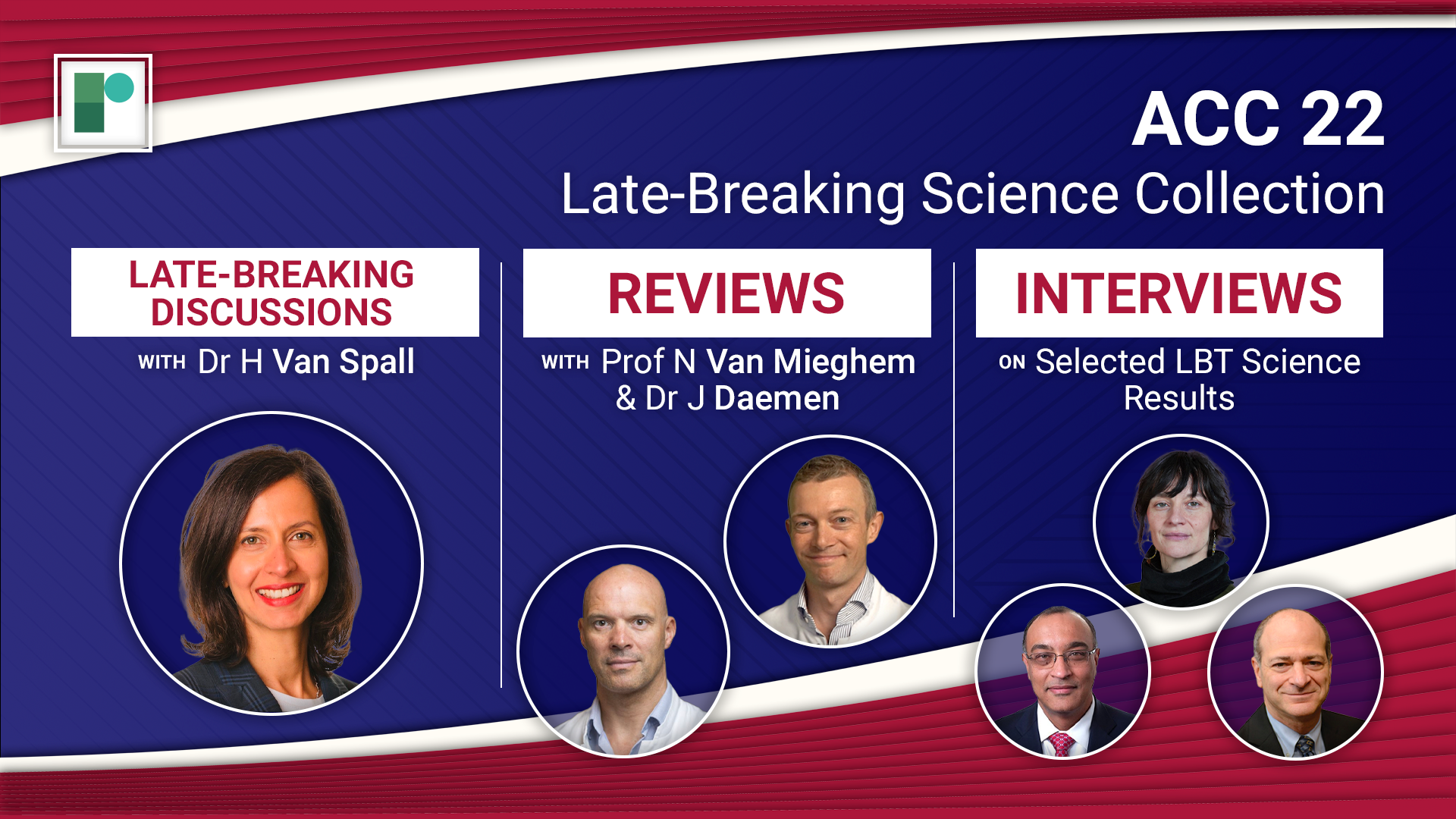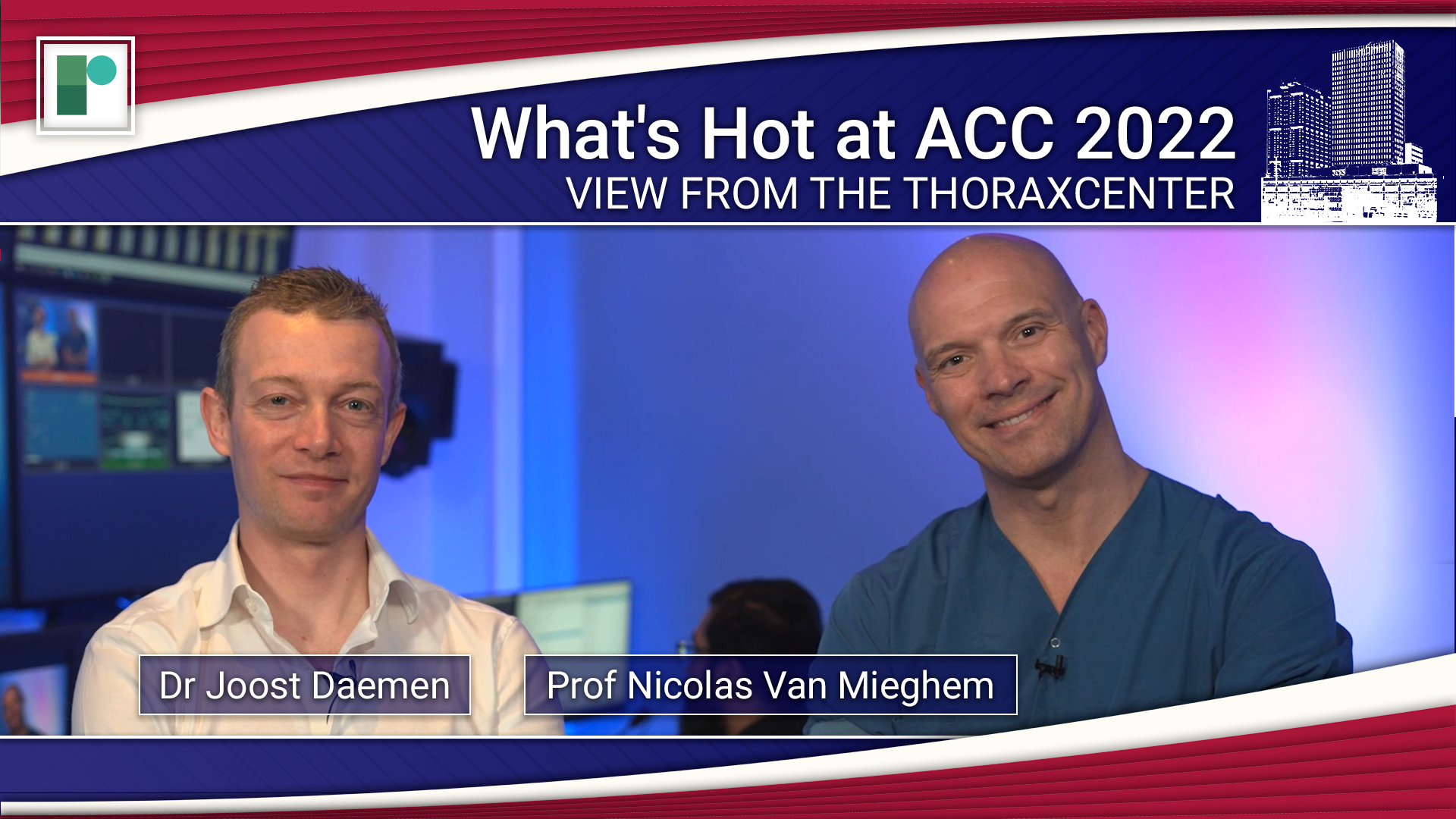ACC 2022: Late-breaking Science Video Collection
Published: 05 April 2022
-
Views:
 7614
7614
-
Likes:
 7
7
-
Views:
 7614
7614
-
Likes:
 7
7
-
 12m 6sPart 4 | Session 1 ACC 22: 3 Trials That Will Change Your Practice with Dr Purvi Parwani
12m 6sPart 4 | Session 1 ACC 22: 3 Trials That Will Change Your Practice with Dr Purvi Parwani -
 6m 15s
6m 15s -
 7m 9sPart 4 | Session 3 4 Lipid Late-breaker Highlights from ACC.22 with Dr Erin Michos
7m 9sPart 4 | Session 3 4 Lipid Late-breaker Highlights from ACC.22 with Dr Erin Michos
-
 23m 9sPart 1 | Session 1 ACC 22 Late-breaking Science Preview Nicolas M Van Mieghem, Joost Daemen
23m 9sPart 1 | Session 1 ACC 22 Late-breaking Science Preview Nicolas M Van Mieghem, Joost Daemen
-
 28m 6sPart 1 | Session 2 ACC.22 Late-breaking Science Wrap-Up Nicolas M Van Mieghem, Joost Daemen
28m 6sPart 1 | Session 2 ACC.22 Late-breaking Science Wrap-Up Nicolas M Van Mieghem, Joost Daemen
-
 16m 42sPart 2 | Session 1 ACC 2022 Late-breaker Discussion: The SODIUM-HF Trial Justin Ezekowitz, Harriette Van Spall
16m 42sPart 2 | Session 1 ACC 2022 Late-breaker Discussion: The SODIUM-HF Trial Justin Ezekowitz, Harriette Van Spall
-
 16m 57sPart 2 | Session 2 ACC 2022 Late-breaker Discussion: The SuperWIN Trial Harriette Van Spall, Dylan L Steen
16m 57sPart 2 | Session 2 ACC 2022 Late-breaker Discussion: The SuperWIN Trial Harriette Van Spall, Dylan L Steen
-
 15m 38sPart 2 | Session 3 ACC 22 Late-breaker Discussion: The PROMPT-HF Trial Harriette Van Spall, Gregg C Fonarow, Tariq Ahmad
15m 38sPart 2 | Session 3 ACC 22 Late-breaker Discussion: The PROMPT-HF Trial Harriette Van Spall, Gregg C Fonarow, Tariq Ahmad
-
 22m 47sPart 2 | Session 4 ACC 22 Late-breaker Discussion: The DIAMOND Trial Harriette Van Spall, Javed Butler, Faiez Zannad
22m 47sPart 2 | Session 4 ACC 22 Late-breaker Discussion: The DIAMOND Trial Harriette Van Spall, Javed Butler, Faiez Zannad
-
 9m 38sPart 3 | Session 1 ACC 22: Findings from the VALOR-HCM Trial Milind Y Desai
9m 38sPart 3 | Session 1 ACC 22: Findings from the VALOR-HCM Trial Milind Y Desai
-
 7m 19sPart 3 | Session 2 ACC 22: MAVA-LTE Shows Improvement in NYHA Class in Patients Treated with Mavacamten Florian Rader
7m 19sPart 3 | Session 2 ACC 22: MAVA-LTE Shows Improvement in NYHA Class in Patients Treated with Mavacamten Florian Rader
-
 3m 19sPart 3 | Session 3 ACC 22: Results From the PACIFIC AF Trial Manesh R Patel
3m 19sPart 3 | Session 3 ACC 22: Results From the PACIFIC AF Trial Manesh R Patel
-
 3m 6sPart 3 | Session 4 ACC 22: FAME 3 Suggests CABG Outperforms FFR-Guided PCI in Patients with Multivessel Disease Frederik Zimmermann
3m 6sPart 3 | Session 4 ACC 22: FAME 3 Suggests CABG Outperforms FFR-Guided PCI in Patients with Multivessel Disease Frederik Zimmermann
-
 3m 54sPart 3 | Session 5 ACC 22: Results from the TRANSLATE-TIMI 70 Trial Brian Bergmark
3m 54sPart 3 | Session 5 ACC 22: Results from the TRANSLATE-TIMI 70 Trial Brian Bergmark
-
 4m 22sPart 3 | Session 6 ACC 22: Results from the POISE-3 Trial Philip J Devereaux
4m 22sPart 3 | Session 6 ACC 22: Results from the POISE-3 Trial Philip J Devereaux
-
 6m 30sPart 3 | Session 7 ACC 22: ICD Shock Therapies and the Burden of Ventricular Tachycardia Paolo Della Bella
6m 30sPart 3 | Session 7 ACC 22: ICD Shock Therapies and the Burden of Ventricular Tachycardia Paolo Della Bella
-
 6m 3sPart 3 | Session 8 ACC 22: PACMAN-AMI Shows Reduced Plaque Regression in AMI Patients Treated with Alirocumab Lorenz Räber
6m 3sPart 3 | Session 8 ACC 22: PACMAN-AMI Shows Reduced Plaque Regression in AMI Patients Treated with Alirocumab Lorenz Räber
-
 3m 31sPart 3 | Session 9 ACC 22: Magnitude & Duration of Effects of a siRNA Targeting Lp(a) Steven E Nissen
3m 31sPart 3 | Session 9 ACC 22: Magnitude & Duration of Effects of a siRNA Targeting Lp(a) Steven E Nissen
-
 4m 48sPart 3 | Session 10 ACC 22: Results From a sub-study of the POISE-3 Trial Maura Marcucci
4m 48sPart 3 | Session 10 ACC 22: Results From a sub-study of the POISE-3 Trial Maura Marcucci
-
 2m 55sPart 3 | Session 11 ACC 22: Findings from the CoreValve US Pivotal & SURTAVI Trials Michael J Reardon
2m 55sPart 3 | Session 11 ACC 22: Findings from the CoreValve US Pivotal & SURTAVI Trials Michael J Reardon
-
 7m 44sPart 3 | Session 12 ACC 22: ADAPT-TAVR Shows SLT Does Not Affect CO for Patients After TAVR Duk-Woo Park
7m 44sPart 3 | Session 12 ACC 22: ADAPT-TAVR Shows SLT Does Not Affect CO for Patients After TAVR Duk-Woo Park
-
 5m 41sPart 3 | Session 13 ACC 22: Results From the Chocolate-Touch Study
5m 41sPart 3 | Session 13 ACC 22: Results From the Chocolate-Touch Study
-
 2m 25sPart 3 | Session 14 ACC 22: Results from the GIPS-IV Trial Pim van der Harst, Marie-Sophie de Koning
2m 25sPart 3 | Session 14 ACC 22: Results from the GIPS-IV Trial Pim van der Harst, Marie-Sophie de Koning
-
 9m 27sPart 3 | Session 15 ACC 22: FFR vs. IVUS-guided PCI in Intermediate Coronary Artery Stenosis: The FLAVOUR Trial Bon-Kwon Koo
9m 27sPart 3 | Session 15 ACC 22: FFR vs. IVUS-guided PCI in Intermediate Coronary Artery Stenosis: The FLAVOUR Trial Bon-Kwon Koo
-
 5m 35sPart 3 | Session 16 ACC 22: Results From the EMPULSE Study – Empagliflozin Proves Beneficial for Patients With HF Mikhail Kosiborod
5m 35sPart 3 | Session 16 ACC 22: Results From the EMPULSE Study – Empagliflozin Proves Beneficial for Patients With HF Mikhail Kosiborod
-
 10m 24sPart 3 | Session 17 ACC 22: Secondary Analysis of CANTOS Finds LDL & HDL Predict Residual Risk of Atherosclerotic Events Paul M Ridker
10m 24sPart 3 | Session 17 ACC 22: Secondary Analysis of CANTOS Finds LDL & HDL Predict Residual Risk of Atherosclerotic Events Paul M Ridker
Overview
Our regular review series View from the Thoraxcenter hosted by Prof Nicolas Van Mieghem and Dr Joost Daemen (Thoraxcentre, Erasmus MC, Rotterdam, NL) provide a concise analysis of the late-breaking science results and spotlight impactful data.
For a deeper dive into key clinical trial data, Dr Harriette Van Spall (McMaster University, Hamilton, CA)talks with principal investigators in her regular Late-Breaker Discussion Series.
Short, accessible Expert Interviews were conducted with select faculty focusing on the results, applicability, and impact on future research.
More from this programme
Part 1
View from the Thoraxcenter
Part 2
Late-breaker Discussion Series
Part 3
Expert Interviews
Faculty Biographies

Felix Mahfoud
Associate Professor and Senior Physician
Prof Felix Mahfoud is an Associate Professor and senior physician of Internal Medicine and Cardiology at Saarland University Hospital, and Affiliate/Visiting Professor Harvard-MIT Biomedical Engineering, Institute of Medical Engineering and Science, Cambridge, US. Prof Mahfoud completed training in Cardiology and Interventional Cardiology at the Department for Internal Medicine III, Saarland University Hospital, Germany in 2014. Since 2017, he has served as Vice Chairman of the ‘Working Group on Interventional Hypertension Treatment’ for the European Society of Hypertension, and as a Committee Member of the 2018 Hypertension Guidelines.
Transcript
Importance of the SPYRAL HTN-ON MED Pilot Study
Well, we all know that high blood pressure is worldwide risk factor number one, thus, by the availability of safe and effective antihypertensive drugs and lifestyle modification, many patients remain uncontrolled. So there is an unmet need for additional treatment approaches to lower blood pressure in hypertensive patients, and the SPYRAL ON-MED study investigated catheter-based renal denervation in uncontrolled hypertensive individuals treated with one, two, or three antihypertensive drugs.
Design, Patient Cohort and Endpoints
This study included patients with uncontrolled hypertension. Office blood pressure was in between 150 to 180, ambulatory blood pressure was in between 140 to 170, and patients were treated with guideline recommended drug therapy. Indeed, they received one, two, or three antihypertensive drugs, and despite the intake of these drugs, they were uncontrolled. We randomised these patients to an invasive placebo, a sham, and renal denervation using a radio frequency catheter and we followed these patients out to three years.
Key Findings
So first we showed a continued and progressive decline in blood pressure over time. Ambulatory blood pressure was reduced up to 19 millimetres of mercury at 36 month of follow up, and that was significantly larger as compared to the sham group. Although medication was no different between the two groups, when you carefully look into it, detailed look into it, you'll appreciate that the sham group numerically received more drugs although their blood pressure lowering was less pronounced than in the denervation group. And that adds to the knowledge of renal denervation, that indeed, in combination with antihypertensive agents, you can appreciate a significant reduction in blood pressure.
Influence on Guideline Recommendations
This is another piece of the puzzle, adding to the evidence that renal denervation effectively and safely lowers blood pressure in hypertensive patients. We have to documented this in patients without concomitant antihypertensive drugs, we have seen it in patients with antihypertensive agents, one, two, or three, and even on a triple fixed combination. And we have a large cohort of patients being treated in a registry, so 3000 patients. And again, this is a piece of the puzzle showing that in a sham-controlled fashion, you appreciate a sustained reduction in blood pressure, even a progressive reduction in blood pressure out to three years, and that speaks to the relevance of the sympathetic nerves and the capability of renal denervation to lower blood pressure, even over time.
Remaining Questions and What is Left for Renal Denervation
There is an extension to that SPYRAL ON-MED study ongoing with another 260 patients being randomised. And other continued access programme trials are ongoing, registries are ongoing, and these will complement the evidence. I think we have achieved a significant and we have acquired a significant body of evidence indicating that it is efficacious and safe in lowering blood pressure, and that this is an attractive and alternative treatment option in patients with hypertension.
Take-home Messages
So this is an important piece of evidence, because it shows in a sham-controlled fashion that denervation can lower blood pressure out to three years, so there is no indication of reinnervation of sympathetic nerves, functional reinnervation of sympathetic nerves. And it also shows that when you add denervation to medication you can appreciate really significant and clinical meaningful reductions in blood pressure, as said, 20 millimetre of mercury reduction. That's a really important number, that is relevant for patient care.







